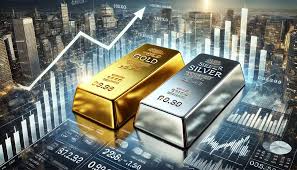

Although gold and silver are stuck in neutral at elevated levels, one market analyst remains a long-term bull on precious metals.
le Hansen, Head of Commodity Strategy at Saxo Bank, published a report Tuesday saying investors and traders are just catching their breath after the market’s nearly $250 rally from its February lows to its peak above $2450 an ounce last month.
Hansen added that although gold has lost some momentum, there is very little bearish sentiment in the marketplace as investors and money managers see no urgency to take profits.
He explained that many hedge funds jumped into gold when prices were still below $2,200 an ounce. This sentiment is helping gold hold sticky support at around $2,300 an ounce.
“It is clear that the bulk of the run-up in prices back in February and March was supported by strong demand from managed money traders, such as hedge funds. Having joined the rally at an early stage, they have subsequently not been forced to adjust (sell) positions as the current correction phase has kept prices above levels that otherwise would have forced them to reduce their exposure,” he said in the report.
“Getting on board early and at much lower levels helps explain why the current gold volatility is relatively low compared with other metals such as silver, platinum, and copper, where speculators joined a bit later and at higher prices, leaving them more exposed to long liquidation and with that, the risk of a deeper correction,” Hansen added.
Looking ahead, Hansen said that one of the biggest pillars of support in the marketplace comes from gold’s role as a safe-haven asset and hedge against market risks as geopolitical uncertainty continues to impact the global economy.
At the same time, Hansen said that growing sovereign debt is also forcing central banks to continue to diversify their foreign reserves away from the U.S. dollar.
As to how long gold and silver’s prolonged consolidation will last, Hansen said that is up to the Federal Reserve. He noted that while retail investors in Asia and central banks continue to support the market, it is still missing a key component: investor demand.
“Gold and silver continue to see limited interest from ETF investors who have remained mostly net sellers since 2022 when the FOMC began its aggressive rate-hiking campaign, raising the cost of carry, or opportunity cost, of holding a non-coupon-paying metal investment. Demand from ETF investors will likely remain subdued until interest rates are lowered, and this cost is reduced,” he said.
Kitco Media
Neils Christensen
